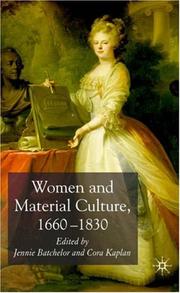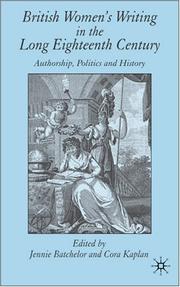| Listing 1 - 10 of 15 | << page >> |
Sort by
|
Book
ISBN: 9781781701829 1781701822 9781847792679 1847792677 9780719082573 0719082579 0719095581 1847797768 Year: 2010 Publisher: Manchester Manchester university press
Abstract | Keywords | Export | Availability | Bookmark
 Loading...
Loading...Choose an application
- Reference Manager
- EndNote
- RefWorks (Direct export to RefWorks)
Women's Work challenges influential accounts about gender and the novel by revealing the complex ways in which labour, informed the lives and writing of a number of middling and genteel women authors publishing between 1750 and 1830.This book provides a particularly rich, yet largely neglected, seam of texts for exploring the vexed relationship between gender, work and writing. The four chapters that follow contain thoroughly contextualized case studies of the treatment of manual, intellectual and domestic labour in the work and careers of Sarah Scott, Charlotte Smith, Mary Wollstonecraft and
English fiction --- Labor in literature --- Women in literature --- Women --- Human females --- Wimmin --- Woman --- Womon --- Womyn --- Females --- Human beings --- Femininity --- Woman (Christian theology) in literature --- Women in drama --- Women in poetry --- English literature --- Women authors&delete& --- History and criticism --- Employment --- History --- Labor in literature. --- Women in literature. --- History and criticism. --- Women authors --- Charlotte Smith. --- Literary Fund. --- Mary Wollstonecraft. --- Sarah Scott. --- division of labour. --- female-authored fiction. --- gender. --- women authors. --- women's work. --- writing.
Book
ISBN: 1474487661 Year: 2022 Publisher: Edinburgh : Edinburgh University Press,
Abstract | Keywords | Export | Availability | Bookmark
 Loading...
Loading...Choose an application
- Reference Manager
- EndNote
- RefWorks (Direct export to RefWorks)
The first major study of one of the most influential periodicals of the eighteenth and nineteenth centuriesProvides the first major study of one of the most influential periodicals of the eighteenth and nineteenth centuriesInterrogates and revises critical commonplaces and narratives about form, authorship, reading and gender through rigorous archival research on the magazine's authors, readers, printers and publishersMaps new directions in eighteenth-century and Romantic studies, women's writing, and media and cultural history by modelling innovative and interdisciplinary methodologies for historical periodical studiesMoves the women's magazine from the periphery to the centre of eighteenth-century and Romantic print cultureIn December 1840, Charlotte Brontë wrote in a letter to Hartley Coleridge that she wished 'with all [her] heart' that she 'had been born in time to contribute to the Lady's magazine'. Nearly two centuries later, the cultural and literary importance of a monthly publication that for six decades championed women's reading and women's writing has yet to be documented. This book offers the first sustained account of The Lady's Magazine. Across six chapters devoted to the publication's eclectic and evolving contents, as well as its readers and contributors, The Lady's Magazine (1770-1832) and the Making of Literary History illuminates the periodical's achievements and influence, and reveals what this vital period of literary history looks like when we see it anew through the lens of one of its most long-lived and popular publications.
Women's periodicals, English. --- English women's periodicals --- English periodicals
Book
ISBN: 1474487645 Year: 2023 Publisher: Edinburgh University Press
Abstract | Keywords | Export | Availability | Bookmark
 Loading...
Loading...Choose an application
- Reference Manager
- EndNote
- RefWorks (Direct export to RefWorks)
Book
Year: 2023 Publisher: [Place of publication not identified] : Edinburgh University Press,
Abstract | Keywords | Export | Availability | Bookmark
 Loading...
Loading...Choose an application
- Reference Manager
- EndNote
- RefWorks (Direct export to RefWorks)
The first major study of one of the most influential periodicals of the eighteenth and nineteenth centuriesProvides the first major study of one of the most influential periodicals of the eighteenth and nineteenth centuriesInterrogates and revises critical commonplaces and narratives about form, authorship, reading and gender through rigorous archival research on the magazine's authors, readers, printers and publishersMaps new directions in eighteenth-century and Romantic studies, women's writing, and media and cultural history by modelling innovative and interdisciplinary methodologies for historical periodical studiesMoves the women's magazine from the periphery to the centre of eighteenth-century and Romantic print cultureIn December 1840, Charlotte Brontë wrote in a letter to Hartley Coleridge that she wished 'with all [her] heart' that she 'had been born in time to contribute to the Lady's magazine'. Nearly two centuries later, the cultural and literary importance of a monthly publication that for six decades championed women's reading and women's writing has yet to be documented. This book offers the first sustained account of The Lady's Magazine. Across six chapters devoted to the publication's eclectic and evolving contents, as well as its readers and contributors, The Lady's Magazine (1770-1832) and the Making of Literary History illuminates the periodical's achievements and influence, and reveals what this vital period of literary history looks like when we see it anew through the lens of one of its most long-lived and popular publications.

ISBN: 9780230007055 0230007058 1349282936 9786613179081 0230223095 1283179083 Year: 2007 Publisher: Basingstoke Palgrave Macmillan
Abstract | Keywords | Export | Availability | Bookmark
 Loading...
Loading...Choose an application
- Reference Manager
- EndNote
- RefWorks (Direct export to RefWorks)
History of civilization --- History of Europe --- anno 1600-1699 --- anno 1700-1799 --- anno 1800-1899 --- Europe --- Material culture in literature --- Material culture --- Women consumers --- Women --- Women as consumers --- Consumers --- Culture --- Folklore --- Technology --- History --- Social conditions --- vrouwen --- gender --- cultuurgeschiedenis --- handel --- sociale geschiedenis --- mode --- beeldhouwkunst --- toegepaste kunst --- bibliologie --- More, Hannah --- Jarvis, Fanny --- Fedorovna, Maria (Tsarina van Rusland) --- 1660 - 1830 --- 17de eeuw --- 18de eeuw --- 19de eeuw --- vrouwen. --- gender. --- cultuurgeschiedenis. --- handel. --- sociale geschiedenis. --- mode. --- sculptuur. --- toegepaste kunst. --- bibliologie. --- More, Hannah. --- Jarvis, Fanny. --- Fedorovna, Maria (Tsarina van Rusland). --- 1660 - 1830. --- 17de eeuw. --- 18de eeuw. --- 19de eeuw. --- Reading habits --- Literature --- Fashion --- Writers --- Publishing houses --- Sculpture --- Libraries --- Book --- Consumption --- sculptuur

ISBN: 140394931X 9781403949318 1349525561 9786613183811 0230595979 1283183811 Year: 2005 Publisher: Basingstoke Palgrave Macmillan
Abstract | Keywords | Export | Availability | Bookmark
 Loading...
Loading...Choose an application
- Reference Manager
- EndNote
- RefWorks (Direct export to RefWorks)
820 "17" --- Engelse literatuur--18e eeuw. Periode 1700-1799 --- 820 "17" Engelse literatuur--18e eeuw. Periode 1700-1799 --- Authorship --- English literature --- Literature and history --- Politics and literature --- Women and literature --- British literature --- Inklings (Group of writers) --- Nonsense Club (Group of writers) --- Order of the Fancy (Group of writers) --- Authoring (Authorship) --- Writing (Authorship) --- Literature --- Sex differences --- History --- Women authors&delete& --- History and criticism --- Women authors --- Great Britain --- 18th century
Book
ISBN: 1137543825 1137543817 Year: 2016 Publisher: London : Palgrave Macmillan UK : Imprint: Palgrave Macmillan,
Abstract | Keywords | Export | Availability | Bookmark
 Loading...
Loading...Choose an application
- Reference Manager
- EndNote
- RefWorks (Direct export to RefWorks)
This book is about mapping the future of eighteenth-century women’s writing and feminist literary history, in an academic culture that is not shy of declaring their obsolescence. It asks: what can or should unite us as scholars devoted to the recovery and study of women’s literary history in an era of big data, on the one hand, and ever more narrowly defined specialization, on the other? Leading scholars from the UK and US answer this question in thought-provoking, cross-disciplinary and often polemical essays. Contributors attend to the achievements of eighteenth-century women writers and the scholars who have devoted their lives to them, and map new directions for the advancement of research in the area. They collectively argue that eighteenth-century women’s literary history has a future, and that feminism was, and always should be, at its heart.
Philosophy. --- Feminist theory. --- Feminism. --- Women --- Material culture --- Social conditions. --- History. --- Culture --- Folklore --- Technology --- Feminism --- Feminist philosophy --- Feminist sociology --- Theory of feminism --- Philosophy
Digital
ISBN: 9781137543820 Year: 2016 Publisher: London Palgrave Macmillan UK :Imprint: Palgrave Macmillan
Abstract | Keywords | Export | Availability | Bookmark
 Loading...
Loading...Choose an application
- Reference Manager
- EndNote
- RefWorks (Direct export to RefWorks)
This book is about mapping the future of eighteenth-century women’s writing and feminist literary history, in an academic culture that is not shy of declaring their obsolescence. It asks: what can or should unite us as scholars devoted to the recovery and study of women’s literary history in an era of big data, on the one hand, and ever more narrowly defined specialization, on the other? Leading scholars from the UK and US answer this question in thought-provoking, cross-disciplinary and often polemical essays. Contributors attend to the achievements of eighteenth-century women writers and the scholars who have devoted their lives to them, and map new directions for the advancement of research in the area. They collectively argue that eighteenth-century women’s literary history has a future, and that feminism was, and always should be, at its heart.
Philosophy --- Sociology of the family. Sociology of sexuality --- big data --- feminisme --- filosofie
Book
ISBN: 9781137543813 Year: 2016 Publisher: London : Palgrave Macmillan UK,
Abstract | Keywords | Export | Availability | Bookmark
 Loading...
Loading...Choose an application
- Reference Manager
- EndNote
- RefWorks (Direct export to RefWorks)
Periodical
Year: 2007 Publisher: London Pickering and Chatto
Abstract | Keywords | Export | Availability | Bookmark
 Loading...
Loading...Choose an application
- Reference Manager
- EndNote
- RefWorks (Direct export to RefWorks)
| Listing 1 - 10 of 15 | << page >> |
Sort by
|

 Search
Search Feedback
Feedback About UniCat
About UniCat  Help
Help News
News